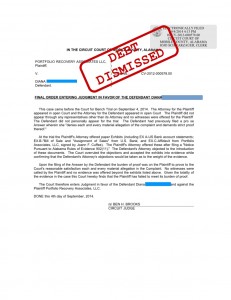
This case represents a trend I’ve noticed among the circuit judges here in Alabama: allowing sketchy debt buyer evidence into the record, but finding in the defendant’s favor anyway.
My client was a good and honest woman who was working hard to claw her way out of debt. She had recently received a promotion at work that boosted her income just above the threshold for garnishment. So when she got served with lawsuit papers from Portfolio Recovery Associates, she was very afraid. Losing 25% of her paycheck to a garnishment would destroy her financially. They were suing her for $6,100, alleging that she owed that balance from a credit card she had once had with U.S. Bank.
She attempted to conduct some basic discovery on her own, and though it did help her delay the trial of the matter, it did not ultimately help her case. The collector didn’t back down and insisted on taking her to trial. Luckily, she hired me in time to analyze her case for all possible defenses. At trial, I objected to their evidence on several grounds, and while the judge considered it a close decision, he ultimately let the evidence be admitted, but took my objections into consideration as to the weight of the evidence. What does that mean? Basically, it means “We agree that the evidence is sketchy, but not so sketchy that we’re going to completely exclude it. Instead, we’ll take a look at it and consider the sketchiness of the evidence as we make a decision.”
This was a bench trial, and experienced judges can do that. I suspect that in a jury trial, where ordinary people cannot realistically be expected to ignore admissibility issues when judging the reliability of a piece of paper they’ve been given, the judge would have sustained my objection.
In the end, the judge found that the evidence just wasn’t strong enough to issue a judgment against my client. While it is a bit more difficult to win like this, it ultimately is better for the consumer because the decision is virtually immune to appeal. Decisions on admissibility are thumbs-up or down decisions that an appellate court can overturn for any good reason. Decisions as to the credibility of witnesses and the finding of facts are the purpose of the trial court, and could only be reversed if the court of appeals found that the trial court’s decision was so wrong that no reasonable person could possibly reach that decision.
Here, the judge made the right decision, and another Alabama consumer was saved from financial ruin by a debt collector.
Portfolio recovery lied to me on several occasions. They promised me a refund and told me that they would not take $100 out of my checking acct. I never received the refund and they took $100 out of my account. I could not buy my medication for the month and had to go to several church based food banks to have food to eat that month. Everything they said was a lie. I do not want to see anyone else go through what I did because of portfolio recovery.
Tommie,
Debt collectors are not allowed to lie to you or trick you into paying something. If their promise not to take the money out was over the telephone, improving that they said it will be very difficult. However, if they promised you in writing or by text or email, then you may be able to take them to court for tricking you. If you reside in Alabama, I may be able to help you take legal action. Feel free to call me at 251-272-9148.